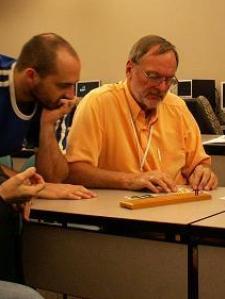
Darrell K. answered • 06/14/18
Tutor
5
(11)
Experienced High School and College Tutor
Step 1: Test n=1(base case), we get (1)(2)(3)=6=3x2; true, then Distribute terms
Step 2: Assume true for n=k, k3+3k2+2k=3*P, where k and P are positive integers if you
Step 3: Check the successor to k, n=k+1, (k+1)((k+1+1)((k+1)+2)=3Q, (k+1)(k+2)(k+3)=3Q.
Distribute and we get k3+3k2+3k+1+3k2+6k+3+2k+2=3Q
Regroup terms (k3+3k2+2k)+3k+1+3k2+6k+3+2=3. Remember (k3+3k2+2k)=3P so, substitute
3P+3k2+9k+6=3Q. I am going to group terms, (3P+6)+(3k2+9k)=3Q, factor out a 3 on both expressions 3(P+2)+3k(k+3)=3Q from there it is obvious to see that this is also divisible by 3.
Proved by induction





